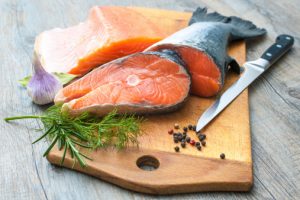
There are many reasons why our hearing begins to fade and, unfortunately, a large factor is simply getting older. Age-related hearing loss affects one in three American seniors over the age of 60. In seniors over the age of 85 these numbers double. Although age-related hearing loss is not life-threatening, it can greatly (and negatively) impact a person’s way of life.
If hearing is a concern for you and you want to ensure you maintain it for as long as possible – really, who doesn’t? – research has uncovered one type of food you should be eating in order to maintain hearing.
Eat fish for better hearing
Their findings suggest that women who consumed two or more servings a week of fish – of any variety (canned, fresh, etc.) – had 20 percent lower risk of hearing loss. Furthermore, the more fish the women consumed, the sharper their hearing remained.
Fish contains essential nutrients which work to boost hearing, but if you want true benefits, don’t deep-fry the fish; it reduces the good nutrients and leaves you with unhealthy trans fats.
Other tips to boost and prevent hearing loss
- Wear protective ear-gear if you work in a loud setting.
- Don’t stand too close to speakers.
- Keep volumes at an enjoyable level – especially if you are using headphones.
- Wear earplugs at concerts or near fireworks.
- Limit the amount of time you are exposed to loud noises.
- Get your hearing checked regularly, especially the older you get.
Negative side effects of hearing loss
- Irritability and anger
- Fatigue, tension and stress
- Avoidance and withdrawal from social situations
- Social rejection and loneliness
- Reduced alertness and increased risk to personal safety
- Impaired memory and ability to learn
- Reduced job power
- Diminished psychological and overall health
If you want to avoid the negative side effects of hearing loss, not only should you make fish a regular part of your diet, but you should also follow the other health tips mentioned above as a means to protect your hearing for years to come.